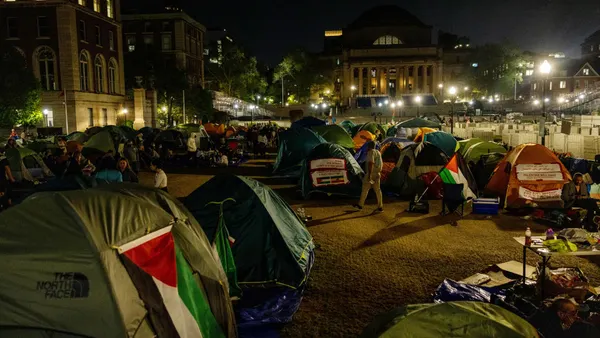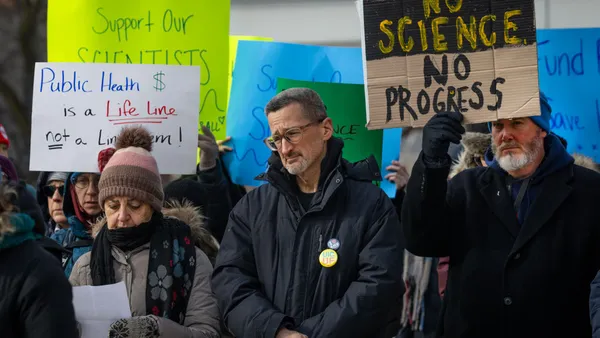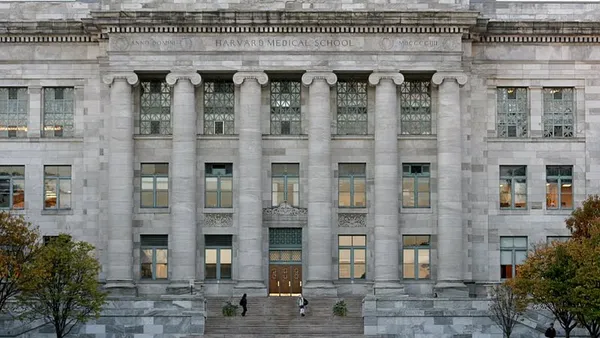Dive Brief:
- President Donald Trump signed an executive order Tuesday targeting diversity, equity and inclusion programs at colleges and other “influential institutions of American society,” escalating the Republican-led crusade against DEI.
- The executive order declares that DEI policies and programs adopted by colleges and others can violate federal civil rights laws and directs federal agencies to “combat illegal private sector DEI preferences, mandates, policies, and activities.”
- Trump’s order also directs each federal agency to identify up to nine corporations or associations, large foundations, or colleges with endowments over $1 billion as potential targets for “civil compliance investigations.”
Dive Insight:
Republicans have railed against diversity and inclusion programming on college campuses for years, with state lawmakers enacting 14 pieces of legislation that restrict or bar DEI since 2023, according to a tally from The Chronicle of Higher Education.
Federal lawmakers have likewise targeted DEI programs at colleges in hearings and proposed bills. With Trump’s flurry of recent executive orders, however, the newly sworn-in president has made clear that his administration will ramp up the fight against DEI at the federal level.
“Institutions of higher education have adopted and actively use dangerous, demeaning, and immoral race- and sex-based preferences under the guise of so-called ‘diversity, equity, and inclusion,’” the order states.
Jeremy Young, director of state and higher education policy at PEN America, a free expression organization, voiced concerns about the executive order.
“It launches a series of investigations into universities for merely having a DEI office or promoting DEI, diversity work on their campus,” Young said. “That, to us, is a pretty straightforward violation of the intellectual freedom of a university to promote ideas of all kinds on its campus.”
At minimum, government investigations could amount to a nuisance, but at maximum, they could lead to lawsuits and actions against colleges, Young added.
Young also said the order is designed to sow division in the higher education sector by targeting colleges with endowments worth $1 billion or more.
“My hope is that higher education institutions will see this attack on a subset of their members as an attack on everyone,” Young said.
Trump’s new order also lacks a clear definition of what it deems as DEI programs or policies, Young said, raising concerns about unconstitutionally vague language.
State bills banning DEI similarly don’t have clear definitions, Young said.
“They become effectively a license to censor,” Young said. “Any government agency looking at them can claim that something is DEI because there is no actual definition in the order.”
Trump's order directs the nation’s attorney general, in consultation with federal agencies, to propose potential litigation against the private sector to enforce civil rights laws. It also orders agencies to identify “potential regulatory action and sub-regulatory guidance.”
Trump also directed the U.S. education secretary to work with the nation’s attorney general to issue guidance to federally funded colleges within the next 120 days regarding how they can comply with the landmark 2023 Supreme Court decision that struck down race-conscious admissions. Trump's nominee for education secretary, former World Wrestling Entertainment president and CEO Linda McMahon, is awaiting Senate confirmation hearings for the post.
Tuesday’s executive order comes after he signed several other directives on the first day of his presidency meant to dismantle DEI efforts within the federal workforce.
Tim Walberg, the Michigan Republican who chairs the House Committee on Education and Workforce, lauded the executive actions against DEI.
“DEI has bloated education budgets while telling students what to think instead of how to think,” Walberg said in a Wednesday statement. “I commend the Trump administration for dismantling DEI.”
Tuesday's executive order clarifies that instructors at colleges that get federal aid are not prohibited from “advocating for, endorsing, or promoting the unlawful employment or contracting practices prohibited by this order” in their academic courses.
But Young said he hasn’t seen any legislation or executive order claiming to restrict DEI that doesn’t also restrict faculty instruction or roles in some way. “We have come to the conclusion that it may be impossible to do that,” Young said.
Trump’s order also says it does not prevent colleges from engaging in speech protected by the First Amendment.
Young, however, said language like this amounts to a meaningless statement, as the First Amendment supersedes an executive order.
“The problem is that the language plainly does violate the First Amendment, and therefore it’s going to be years before the courts adjudicate it and, meanwhile, people have to live under these executive orders,” Young said.














